|
|
|
Sort Order |
|
|
|
Items / Page
|
|
|
|
|
|
|
| Srl | Item |
| 1 |
ID:
128739


|
|
|
|
|
| Publication |
2014.
|
| Summary/Abstract |
In this article I view Asian alliances as a product of universal security needs and culturally constructed variables. While the alliance remains one of the fundamentals of contemporary international politics, I attempt to show through comparative analysis of the Sino-Soviet alliance and the Japan-US security alliance how subtle differences of national developmental experience can significantly affect political outcomes in East Asia.
|
|
|
|
|
|
|
|
|
|
|
|
|
|
|
|
| 2 |
ID:
107098
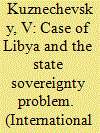

|
|
|
|
|
| Publication |
2011.
|
| Summary/Abstract |
CONCERNED WITH THE FLARE-UPS of popular revolutions in North Africa and the Middle East in March and April and the events in the Libyan Arab Jamahiriya, in the first place, the world community turned its gaze at the United Nations and its role in conflict settlement. The public and the UNSC tried to outline the limits beyond which no international interference in domestic policies was acceptable. In short, the world community wanted to know how state sovereignties could be preserved in the contemporary world; in fact, the future of the Westphalian principles is at stake. The Libyan crisis was unfolding to the accompaniment of the media deliberations, in Russia and the West, that the Westphalian principles should be abandoned. Nikolai Zlobin, a Russian migr living in the United States, Director of Russian and Asian Programs at the Washington-based World Security Institute, published in Rossiiskaia gazeta, the newspaper of the RF government, a long article called "Konets suverenitetov" (The End of Sovereignties). He has come close to admitting that the international law based on the Westphalian principles is a thing of the past. "The tragedy in Japan or, for example, in Libya has shown that the national sovereignty cannot be protected any longer," he writes. In the 21st century, he goes on to say, "the priority of national sovereignty per se vs. the world community's basic interests can no longer be preserved; the same applies to the principle of non-interference in domestic affairs and inadmissibility of ensuring safety of a country, region or people by external forces; otherwise the world community will have to pay dearly. At least this is how I see it from Washington.
|
|
|
|
|
|
|
|
|
|
|
|
|
|
|
|
| 3 |
ID:
133841
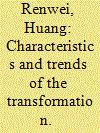

|
|
|
|
|
| Publication |
2014.
|
| Summary/Abstract |
The characteristics of the transformation of the contemporary international system are unprecedented since the birth of the Westphalian system, and even since the end of world war - II and cold war. The transformation of the contemporary international system is reflected firstly in the structural changes to international power, namely the transfer of power. The transfer of power and the transformation of the international order were accomplished through war throughout modern history
|
|
|
|
|
|
|
|
|
|
|
|
|
|
|
|
| 4 |
ID:
121728
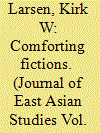

|
|
|
|
|
| Publication |
2013.
|
| Summary/Abstract |
Observers and practitioners of Sino-Korean relations in both the pre- and post-nineteenth century have utilized powerful "comforting fictions" to describe and justify power asymmetry. In the prenineteenth- century period, the idea of the "tribute system" put a veneer of Confucian benevolence on what a closer examination reveals to have been unequal and coercive relations. Western proponents of the Westphalian system of sovereign equality saw the new norms of international relations as potentially liberating to Korea, a way to free Korea from the Chinese yoke. However, Westphalian equality, too, was a comforting fiction that masked the reality of imperialism-both formal and informal. The Qing empire played a heretofore neglected role in both types of unequal coercive relations between Korea and the outside world.
|
|
|
|
|
|
|
|
|
|
|
|
|
|
|
|
| 5 |
ID:
164207
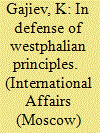

|
|
|
|
|
| Summary/Abstract |
SWEEPING CHANGES of epochal dimensions are caused by the deep-cutting shifts in the most important spheres of social life at the national, regional and global levels, protracted social and economic crises, wars, disintegration of the old and emergence of new ambitious powers, etc. These shifts marked essential stages in the development of international political systems; they were responsible for the disintegration of great civilizations, empires, world powers, and the corresponding world orders. In October 1648, the Westphalian system, the product of the Peace of Westphalia, ended the Thirty Years' War in Europe and buried Roman Catholic universalism and the Holy Roman Empire. The balance of power, the system formulated by the Vienna Congress of 1815, that rested on Westphalian principles was built up on the ruins of Napoleon's empire. The Versailles-Washington system is the product of World War I that destroyed the Austro-Hungarian and Ottoman empires and detached big chunks from the territory of the Russian Empire. The bipolar world was one of the results of the rout of the Third Reich and the Land of the Rising Sun in World War II. In the final analysis, this war delivered a fatal strike to the great colonial empires of Great Britain, France, the Netherlands, and Portugal. Here I will try to identify and analyze systemic and structural components of the so-called liberal or unipolar world order that replaced the bipolar world order when the Cold War had ended and the Soviet Union with its history of triumphs and failures had disintegrated.
|
|
|
|
|
|
|
|
|
|
|
|
|
|
|
|
| 6 |
ID:
123911
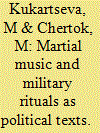

|
|
|
|
|
| Publication |
2013.
|
| Summary/Abstract |
DRAMATIC OR EVEN PIVOTAL events of the turn of the 21st century have changed forever the course of world politics and the structure of international relations; transformations of the entire world system in the next decade cannot be excluded.* It remains to be seen whether the U-turn will be a catastrophe (humanitarian or any other) followed by a war or the mounting egoism of economic might will cause, relatively painlessly, a shift of power poles, regime change and replacement of priorities.
|
|
|
|
|
|
|
|
|
|
|
|
|
|
|
|
| 7 |
ID:
180755
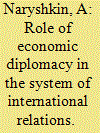

|
|
|
|
|
| Summary/Abstract |
THE TERM "system of international relations" has become part and parcel of the professional vocabulary of historians and political scientists. A system of international relations or a world order is a form of organization of international relations that reflects the entire spectrum of relationships among members of this system (actors) and their hierarchy. These relationships are based on principles that are enshrined in international legal documents, namely treaties and agreements.
|
|
|
|
|
|
|
|
|
|
|
|
|
|
|
|
|
|
|
|
|